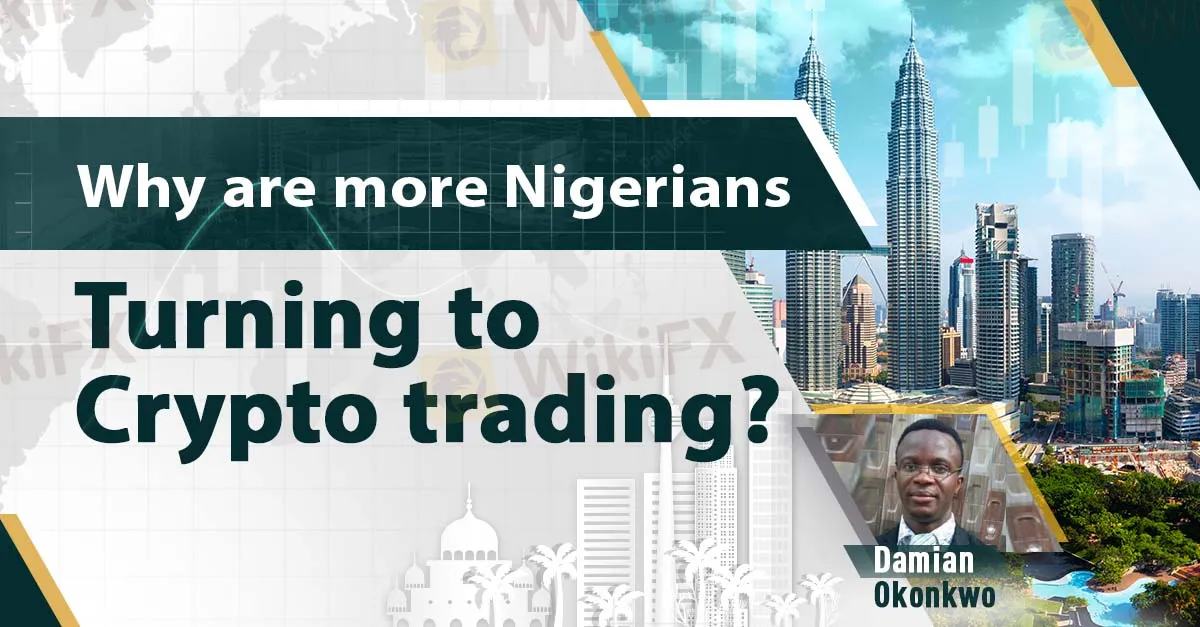简体中文
繁體中文
English
Pусский
日本語
ภาษาไทย
Tiếng Việt
Bahasa Indonesia
Español
हिन्दी
Filippiiniläinen
Français
Deutsch
Português
Türkçe
한국어
العربية
Why are more Nigerians Turning to Crypto trading?
Abstract:The rising interest in crypto trading among Nigerians is a multifaceted phenomenon driven by economic factors, accessibility, international transactions, financial sovereignty, education, and regulatory advancements.

By: Damian Okonkwo

In recent years, Nigeria has witnessed a significant surge in interest in cryptocurrency trading as more individuals are exploring digital assets for savings and payments. This shift can be attributed to various factors, including economic uncertainties, technological advancements, and the growing awareness of the benefits offered by cryptocurrencies.
Why are more Nigerians turning to Crypto trading?
The rising interest in crypto trading in Nigeria today is driven by several factors, including:
1. Economic Challenges: Nigeria's economy has faced significant headwinds in recent years, with high inflation and devaluation of the Naira eroding purchasing power. Traditional savings options often offer low returns, failing to keep pace with inflation. This has led Nigerians to explore alternative avenues to preserve and potentially grow their wealth.
2. Limited Access to Traditional Finance: A large portion of the Nigerian population remains unbanked or underbanked, lacking access to traditional financial services. Cryptocurrencies offer a more accessible alternative, requiring only a smartphone and internet connection to participate.
3. Potential for High Returns: While inherently volatile, cryptocurrencies offer the potential for high returns, attracting individuals seeking to outpace inflation and potentially achieve financial gains. However, it's crucial to remember that these gains are not guaranteed and come with significant risks.
4. Rise of Crypto Exchanges and Platforms: The emergence of user-friendly crypto exchanges and platforms tailored to the Nigerian market has made it easier for individuals to buy, sell, and trade cryptocurrencies. These platforms often offer localized payment methods and educational resources, further mendorong adoption.
5. Remittances and Cross-Border Transactions: Nigeria, like many other countries, has a significant diaspora contributing to its economy through remittances. Cryptocurrencies offer a faster and more cost-effective solution for cross-border transactions compared to traditional banking systems. This has led to an increasing number of Nigerians using cryptocurrencies to send and receive funds internationally, avoiding high fees and delays associated with traditional remittance channels.
6. Entrepreneurial Opportunities: The crypto boom in Nigeria has not only attracted individual investors but has also spurred entrepreneurial initiatives. Startups and businesses are emerging to cater to the growing demand for cryptocurrency-related services, such as trading platforms, wallet services, and educational resources. This entrepreneurial ecosystem contributes to job creation and economic growth.
7. Technological Advancements: The advancement of technology, particularly the widespread use of smartphones and internet connectivity, has facilitated the adoption of cryptocurrencies. With mobile apps and user-friendly interfaces, individuals can easily engage in crypto trading, making it more accessible to a tech-savvy population.
Challenges and Risks
Despite the growing interest, it's important to acknowledge the challenges and risks associated with cryptocurrency trading in Nigeria:
● Volatility: Cryptocurrencies are inherently volatile, and their value can fluctuate significantly, leading to potential losses.
● Regulation: The regulatory landscape surrounding cryptocurrencies in Nigeria is still evolving, creating uncertainty for investors and businesses.
● Scams and Fraud: The crypto space is susceptible to scams and fraudulent activities. Individuals must be cautious and only use reputable platforms and practices.
● Limited Infrastructure: The infrastructure for widespread adoption of cryptocurrencies for payments in Nigeria is still in its early stages.
Conclusion
The rising interest in crypto trading among Nigerians is a multifaceted phenomenon driven by economic factors, accessibility, international transactions, financial sovereignty, education, and regulatory advancements. As this trend continues, it will be essential for stakeholders, including regulators and market participants, to work collaboratively to ensure a sustainable and secure crypto ecosystem in Nigeria.

Disclaimer:
The views in this article only represent the author's personal views, and do not constitute investment advice on this platform. This platform does not guarantee the accuracy, completeness and timeliness of the information in the article, and will not be liable for any loss caused by the use of or reliance on the information in the article.
Read more

“Seeing Diversity, Trading Safely”: WikiEXPO Dubai 2024 Opens New Horizons for the Fintech Industry
Dubai, UAE — The WikiEXPO Dubai 2024, hosted by WikiGlobal, successfully concluded on November 27, attracting wide attention from the global financial technology sector. The event was co-organized by WikiFX and the Australian Computer and Law Association (AUSCL), with strong support from the Mauritius Financial Services Institute (FSI) and the government of Liberland. Through an innovative hybrid model of online and offline participation, WikiEXPO Dubai 2024 achieved an impressive 1,267,886 online views and gathered 3500+ on-site participants, bringing together 550+ industry leaders and attracting close coverage from over 1300+ global media outlets.

BaFin Issues Warning Against Clone Broker Exploiting Pepperstone's Identity
The German Federal Financial Supervisory Authority (BaFin) has recently flagged a fraudulent clone of the licensed retail FX and CFD broker Pepperstone. This fake entity, operating under the domain pepperstone.life, has been offering financial and investment services without obtaining the necessary regulatory authorisation.

TikTok: A Rising Hub for Investment Scams in Malaysia
The Royal Malaysian Police (PDRM) have raised concerns over the increasing use of TikTok by criminal syndicates to lure victims into investment scams.

Webull Canada Expands Trading Hours with Options Trading
Webull Canada now offers extended trading hours from 4 a.m. to 5:30 p.m. ET, plus options trading. Gain flexibility and manage risk in an ever-changing market.
WikiFX Broker
Latest News
Saxo & Portuguese Bank Partnership
SEC Fines Broker-Dealers $275K for Incomplete SAR Filings
Elon Musk Warns of Imminent US Bankruptcy | Bitcoin Retreats from $100K
WikiEXPO Global Expert Interview: Advanced Practices and Insights in Financial Regulation
Justin Sun Invests $30M in Trump-Backed World Liberty Financial
Kraken Closes NFT Marketplace Amid New Product Focus
Robinhood Launches Ethereum Staking with 100% Rewards Match
Lured by False Promises: Malaysian Driver Lost RM218K to an Investment Scam
FTX Sets March 2025 Timeline for Creditor Payouts: What It Means for Investors
What is an Economic Calendar? How it works
Currency Calculator


